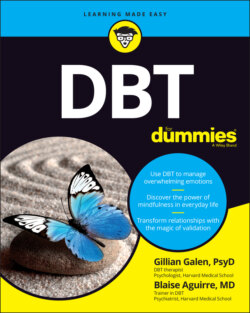Читать книгу DBT For Dummies - Gillian Galen - Страница 100
Limiting their disruption
ОглавлениеTo limit the disruption of emotional triggers, you have to know what they are. You can use the following process of examination to recognize them:
What is the environmental trigger? What was the thing that happened that led to the emotions now leading to your urges to respond in a particular way? For example, your partner told you that he was going to be home for dinner, and you become angry when your mother calls to tell you that she thinks she saw him having a drink with his friends at a bar.
What is your internal mood state? Label the emotion. In this example, you notice feeling jealous and then angry that your partner has been dismissive of you. You also notice feeling confused and then upset with your mother because she isn’t actually certain that it was him.
What is your short-term objective in the present moment? In this example, you want to make sure that you’re in a calmer state by the time your partner comes home so that you don’t accuse him of doing something that he might not actually have done.
What is your long-term goal? You want to be able to trust your partner and have calm conversations with him — ones that are direct and full of curiosity.
What actions will be consistent with your long-term goal? Will your actions allow you to accomplish your goal? Will being upset help you attain this goal, or should you regulate to a state of being calmer and recognize that you have only a tiny snippet of information on which you and your mother may have come to unhelpful conclusions?
If you act on your urge, will this help you attain your goal, or will it interfere with attaining your goal? If you start yelling at your partner the second he walks through the door, accusing him of being uncaring and a liar, will this help you have a more trusting relationship with him? On the other hand, if he is being dismissive of you, will simply being angry without being curious as to what happened be consistent with how you value yourself?
If you act on your urge, will you later regret having so acted? What have past experiences taught you? Have you yelled at past partners, and if so, how did these relationships end up?
While these questions may seem obvious to a person who doesn’t engage in mood-dependent behavior, they reflect the mindful path to limiting a trigger’s disruption to one’s quality of life and significant relationships.
